EXTENDED! CO residents can apply FOR FREE through December 1st. Apply now!
Secure your scholarship offer in just 2-3 days through December 17! Get started.
No waiting. No guessing. Join us for Instant Decision Day on December 3. Register now.
EXTENDED! CO residents can apply FOR FREE through December 1st. Apply now!
Secure your scholarship offer in just 2-3 days through December 17! Get started.
No waiting. No guessing. Join us for Instant Decision Day on December 3. Register now.
At the Korbel School’s Frederick S. Pardee Institute for International Futures, research is more than an academic exercise; it’s about supporting a global community that tackles today’s most consequential issues - from climate and conflict to development and security.
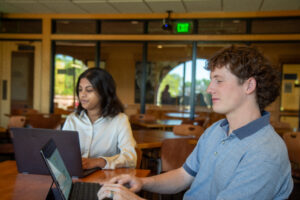
The Pardee Institute collaborates with people who are invested in our global future, including officials in governments, intergovernmental organizations, and international agencies, as well as practitioners who carry out their decisions and those with a stake in the downstream effects of those decisions.
At the heart of this work is the International Futures integrated assessment model, a one-of-a-kind global forecasting tool that helps identify and analyze the fundamental forces driving change over the coming decades, informing smarter policy decisions and more resilient planning. This powerful forecasting platform simulates how changes in one system - like health or energy - ripple across others, from governance to education to the environment.
But behind the sophistication of IFs and the breadth of Pardee’s research portfolio is a driving force that helps bring it to life: students. In the 2024-25 academic year, 88 University of Denver students, primarily from the Korbel School, played an essential role in advancing the Institute’s work. Organized into six specialized teams, these students contributed to everything from data modeling and diplomacy research to communications and operations - bringing both depth and agility to Pardee’s global initiatives.
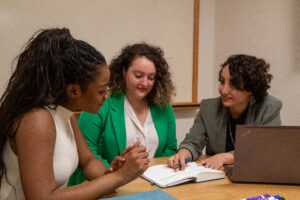
“The projects I worked on include Multilateral Treaties, UNGA, Embassies, and the IGOs. For each of these projects, I coded and vetted data, strengthening my attention to detail and improving my ability to work with complex datasets.”
-Maya Rai, Core Diplo
Some students work directly with the Pardee Institute’s flagship tool, the International Futures (IFs) model, contributing to both internal development and external research collaborations. Pardee Fellows - selected graduate students from the Korbel School - support scenario design, literature reviews, and client projects with global partners. Alongside them, the IFs Data Team maintains the model’s vast database, ensuring its accuracy and usability through technical work that supports long-term forecasting and real-world policy analysis.
Other teams focus on building the Institute’s empirical foundations. The Country and Organization Leader Travel (COLT) team, Pardee’s largest student cohort, maintains a one-of-a-kind dataset tracking the international travel of global leaders. Students gather and code open-source data, transforming it into structured insights that support diplomacy research. The Core Diplometrics team compiles data on international treaties, diplomatic representation, and organizational memberships, while the Perceived Mass Atrocities Dataset (PMAD) team contributed to a multi-year effort documenting mass atrocity events worldwide.
Meanwhile, the Institute’s communications and business operations are also student-powered. From managing Pardee’s web presence and writing research summaries to supporting HR, payroll, and event logistics, students help shape how the Institute functions and how its work is shared with the world. Their contributions ensure that Pardee’s insights reach diverse audiences - from policymakers to the public - with clarity, consistency, and professionalism.
Across all teams, students describe their experience at Pardee as transformative. They gain technical skills in data analysis, coding, and modeling; they refine their writing and communication abilities; and they learn to navigate the demands of collaborative, deadline-driven research. More than that, they find themselves contributing to projects with real-world relevance - projects that influence policy, inform global institutions, and shape public understanding.
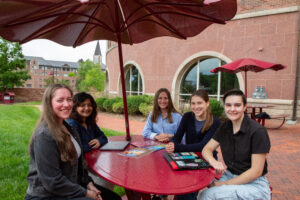
“The Pardee Institute has encouraged me to step out of my comfort zone and nurture my curiosity. My work here has refined my writing and critical thinking skills, equipping me for the professional world.”
-Wara Irfan, Marcom
As Director of Analysis Collin Meisel explains, this impact runs both ways. “Simply put, some of our research, like the COLT project, would not exist without our student research aides. Across this and many other projects, the unique perspectives that students bring, the questions they ask, the big and small suggestions they make, and the hard work they put in improves the work we do together in immeasurable ways. In turn, we aim to improve their professional lives and set our students up for future success, whether that be at a think tank, in government, an NGO, or whichever path they choose to carve in their career after Pardee.”
At the Pardee Institute, students don’t just get to join the conversation - they gain the skills to lead it, equipped with tools that last well beyond graduation. Their contributions are not auxiliary; they are essential. And in the process, these students are not only preparing for their futures - they’re helping to shape the future of global affairs.
For an in-depth look at the work taking place at the Pardee Institute, check out their 2024-2025 Annual Review.
This reflection was written by Ahmad Saleem (MA, International Security, 2025), one of four students selected to represent the Josef Korbel School of Global and Public Affairs at the 2025 Aspen Security Forum.
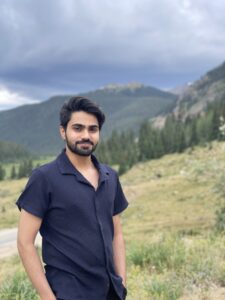
From July 15–18, I had the privilege of representing the Josef Korbel School of Global and Public Affairs as part of a student delegation at the 2025 Aspen Security Forum. As the only university partnered with the Forum, Korbel’s presence stood out—we were proud to be the only students attending among a distinguished gathering of world leaders, policymakers, and experts in global security.
The forum was insightful, exposing me to a wide range of opinions on pressing global issues. A recurring theme throughout the event was the growing role of artificial intelligence and cybersecurity in international security. In the session Cracking the Code: AI and National Security, we heard from Tarun Chhabra, Head of National Security at Anthropic and Distinguished Visiting Fellow at the Hoover Institution, Stanford University, and Katrina Mulligan from OpenAI for Government. These speakers, representing both public and private sectors, discussed how AI is poised to transform the security landscape. As an international security student, I was deeply intrigued by these discussions.
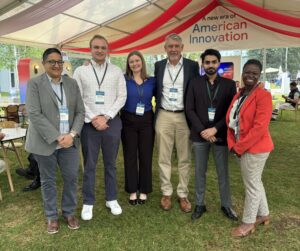
Another recurring theme was the future of European defense. A powerful session on this topic featured Baiba Braže, Minister of Foreign Affairs of Latvia. Following the discussion, our Korbel delegation had the privilege of engaging with the Latvian delegation, who kindly invited us to the upcoming Rīga Conference. Korbel also hosted a session at the Forum titled Russia, Ukraine, and Beyond. This session explored the geopolitical and defense implications of the Russia-Ukraine war and featured a remarkable lineup of speakers: Dr. Condoleezza Rice—Korbel alum and former U.S. Secretary of State—Pasi Rajala, Political State Secretary for Finland’s Foreign Ministry, and Halyna Yanchenko, Member of Ukraine’s Parliament and Head of the Investment Taskforce for the Defense Industry. The discussion emphasized the enduring importance of transatlantic partnerships and the need for sustained global support for Ukraine. It was a proud moment when Dr. Condoleezza Rice recognized Dean Fritz Mayer and the Korbel School for organizing the session.

The forum also came at a pivotal moment for Middle Eastern geopolitics. The session titled Israel at a Crossroads featured Amos Yadlin, former Chief of the IDF Intelligence Directorate, and Michael Herzog, former Israeli Ambassador to the U.S. and Tisch Distinguished Fellow at the Washington Institute for Near East Policy. They discussed Israel’s evolving strategic posture and described its military doctrine as one of “short, decisive, and limited war.” I appreciated that the forum also provided an alternative narrative through Dr. Vali Nasr’s book talk on Iran's Grand Strategy: A Political History. His presentation offered a deep dive into Iran’s domestic politics and its shifting strategic paradigms. Dr. Nasr argued that, in contrast to Israel’s doctrine, Iran’s strategy is oriented toward long-term, less decisive conflicts. These sessions together provided a comprehensive and nuanced understanding of regional dynamics.
One of the most fascinating sessions for me was Great Power Competition – Global POVs. This panel offered compelling perspectives from the Global South and included speakers such as Hina Rabbani Khar, Former Foreign Minister of Pakistan; Claudia Ruiz Massieu, Former Foreign Minister of Mexico; and Balázs Orbán, Political Director to the Hungarian Prime Minister. It was especially insightful to hear how different regions interpret great power dynamics—and why including these voices is crucial for shaping inclusive global policy.
Outside the formal sessions, I, along with other Korbel students, was invited to informal networking opportunities. These provided a chance to connect with professionals working in tech, defense, and government. As someone who aspires to work in think tanks, especially in Washington, D.C., I was excited to meet individuals from the Atlantic Council, Aspen Institute, Center for a New American Security, and Delphi Global. Many of them were already familiar with the Korbel School and expressed willingness to support me and my fellow students in our career journeys. Beyond these professionals, I also met a Stanford graduate who had recently founded an AI company supporting semiconductor development. These connections helped me not only network professionally but also draw inspiration from fellow academics and innovators.
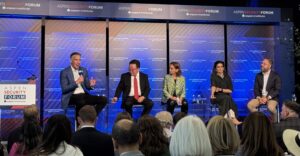
I returned from Aspen with a new perspective on global security issues and a wealth of connections. I truly felt that this opportunity, along with the Korbel School, provided a bridge between theoretical knowledge and real-world practice. I am deeply grateful to Dean Fritz Mayer, Prof. Naazneen Barma, and the Scrivner Institute of Public Policy for providing this opportunity. Experiences like this are a powerful reminder of how the Korbel School continues to empower students like me to connect academic learning with real-world policy and practice.
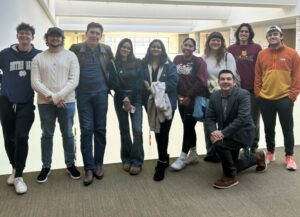
Teaching Assistant Professor Dr. Stefan Chavez-Norgaard’s lifelong interest in public policy began at just six years old. As he took Philadelphia’s SEPTA train from his grandparents’ house to Center City, he was struck by the disparate quality of livelihoods visible from his window. “Even as a young kid,” he said, “I was shocked by the inequalities that the city line could mean in terms of land use, tree cover, and house size.”
That early awareness of inequity sparked a lifelong passion for public policy and urban planning, one that eventually brought him to the Josef Korbel School of Global and Public Affairs, where he is now completing his first year as a faculty member.
“That’s where it all started,” he reflected. “A six-year-old visiting his grandparents with his mom and dad.”
That moment on the train sparked more than curiosity; it ignited a lifelong commitment to understanding how people with different lived experiences exist alongside one another, and how systems can either support or hinder that possibility. “The throughline across all my research is how can people of different backgrounds — racial, ethnic, gender, and class — live together side by side, as opposed to being separated by walls, segregation, and disparity,” Dr. Chavez-Norgaard explained.
That guiding question led him to Johannesburg, South Africa, where he returned many times to study the Born Free Generation: the first cohort to come of age without direct memory of apartheid. “This generation represented a really amazing historical moment — a society of explicit racial hierarchy and oppression giving way to a multiracial democracy,” he said.
Dr. Chavez-Norgaard’s research centers on local democratic governance — bottom-up forms of engagement — and in Johannesburg, he found a powerful case study of a multiracial society striving to transcend its past. “I’ve stayed in touch with many of the original interviewees from my undergraduate thesis. They became interviewees in my PhD dissertation — and now, I would call them friends.”
The insights gained from this work not only shaped his academic journey but also drew him to Colorado, where he was born and raised, and where the intersection of democratic engagement and urban development offered new opportunities to continue his exploration. So, when the opening for a faculty position at the Korbel School popped up, Dr. Chavez-Norgaard was immediately interested. “There’s a sort of pragmatism about democratic problem solving in Colorado,” he said. “And then there’s the nature and beauty of the region as well as dynamism and growth.”
Throughout his first year, Dr. Chavez-Norgaard visited neighborhood associations and community organizations, which led to involvement in projects like the East Colfax Bus Rapid Transit (BRT) project. The effort to bring public transportation to this part of Denver required collaboration among a diverse range of stakeholders, creating a dynamic participatory process at the intersection of democratic principles and urban planning. “Who’s the envisioned rider of such a system?” he asked himself. “What about the displacement of existing residents of Colfax? Is BRT along Colfax even the right answer?” Projects like this, and the complex questions they raise, have affirmed that coming to Colorado was the right decision — a place where his research can take root and make a tangible impact.
All Dr. Chavez-Norgaard’s efforts networking across the city culminated in making his debut Public Policy Analysis classes possible – one for undergraduates and another for graduate students. “These aren’t your typical lecture-based courses,” he said. “They’re chances for students to dive into real-world policy work, connect with professionals, and explore how cities like Denver interact globally.” Throughout the quarter, students meet with a lineup of inspiring guest speakers, taking an experiential learning approach.
Some of the guest speakers are former ambassadors, representatives from institutions like the Truman Center, the Pacific Disaster Center, World Denver, and multiple members of the Colorado Consular Corps. Students work directly with the U.S. Department of State and Colorado’s Office of Economic Development and International Trade (OEDIT) on client-based projects.
Much of this is powered by the Korbel alumni network, which plays a big role in opening doors. Former students now working in these agencies are eager to give back, mentoring current students, and bringing their professional world into the classroom.
Dr. Chavez-Norgaard’s first year at Korbel has been defined by connection to his colleagues, students, and the broader Denver community. By grounding his teaching in hands-on experiences and his research in questions that matter across borders and backgrounds, he’s created a learning environment that is as intellectually rigorous as it is personally meaningful.
“I’ve felt welcomed and supported by the Korbel faculty from the very beginning, and I’m hoping to grow alongside faculty and staff colleagues at Korbel, whom I hope I can think of as lifelong friends,” he shared. That spirit of collaboration and purpose is shaping not just his own path, but the journeys of the next generation of public policy leaders — students learning to navigate complexity with clarity, empathy, and a drive to make a difference.
Dr. Hilary Matfess, Assistant Professor and Director of Korbel’s International Security Degree, never planned to study gender and war. However, a series of unexpected obstacles early in her career forced her to rethink her approach and ignited a passion for uncovering overlooked narratives—one that continues to fuel her work today.
“I love telling my students how I started this work because my entire career is an exercise in serendipity and mistakes,” she said.
From Serendipity to Passion
Dr. Matfess, who has taught at Korbel since 2021 and is an affiliate of the Sié Chéou-Kang Center for International Security and Diplomacy, examines how women mobilize for war globally with a focus on sub-Saharan Africa. She looks at what they do in non-state armed groups, “which is a clunky academic term,” she explained, “for any group that’s not ‘official’ state military.” Her work explores why women join these groups, their roles, and their personal experiences within them.
“When I was getting my master's degree, I had the opportunity to work as a research assistant tracking political or social violence in Nigeria,” she said. When she arrived to study Boko Haram, Dr. Matfess found that she couldn’t access the armed men at the heart of the conflict. “I was ambitious enough to think I’d get to the bottom of Boko Haram as a 20-something. Turns out, insurgencies are very good at staying hidden. I was really frustrated that I couldn't sit down with the people that I thought were at the heart of the war, which would be armed young men my age or younger.”
Fortunately for Dr. Matfess, what started as a roadblock became an opportunity that would shape the course of her work for years to come.
“Through other activists, practitioners, and academics, I landed interviews in displacement camps and with people who fled the crisis. Mostly women. Really embarrassingly, I treated them like a consolation prize at first, but they revealed conflict dynamics that I didn't see reflected in any of the narratives around Boko Haram. From then on, I became obsessed with shedding light on this under-explored dynamic of how armed groups function.”
Bringing Women’s Experiences from the Margins into the Light
Much of Dr. Matfess's research feels like assembling a puzzle with missing pieces. Alongside Associate Professor Meredith Loken, who teaches at the University of Amsterdam, she built the Women’s Activities in Armed Rebellion (WAAR) Dataset—tracking women’s roles across more than 350 rebel groups worldwide. The challenge? “Women’s experiences are often tucked away in offhand comments or footnotes, if they’re mentioned at all. It can be hard to track them down.”
Women’s experiences reveal how policymakers need to respond to crises and how counterinsurgency responses should adapt. “Bringing women’s experiences from the margins into the light — that’s the work. It’s essential to understanding not only conflict itself but also how we build more effective policies for peace.”
Celebrating Women’s History Month: Honoring Women's Stories in March and Beyond
For Dr. Matfess, Women’s History Month has been less about grand gestures and more about reaffirming why her work matters daily. “It’s a reminder of the power of global women’s networks, activism, and what’s possible when we center gender in building political movements and communities of care,” she said.
Her perspective is a call to action—one that acknowledges both progress and persistent challenges. As she points out, “We’re living through a backlash moment on gender equality, and it’s exhausting. We need to rebrand more inclusive institutions as meritocracies because that’s what they’ve always been. It’s not about political correctness. The best person for the job only emerges when the playing field is actually level.”
Dr. Matfess brings this same urgency and dedication into the classroom. As degree director for International Security, she prepares her students for careers ranging from defense and intelligence to advocacy and policy analysis, emphasizing that security extends beyond military might to include human security, gender justice, and economic stability.
Her students, in turn, fuel her optimism. “They care so much about the world, and they challenge me every day with fresh questions and new perspectives.” Their passion and curiosity reflect the change Women’s History Month and work like hers seek to inspire—not just in March, but every day. To learn more about Dr. Matfess's work, visit her website here.
Women’s History Month is a moment to reflect not only on women’s achievements but also on the untold stories of women whose experiences are often pushed to the margins—including those in conflict zones. To learn more, visit the official Women’s History Month website, or check out Korbel's initiatives through our Inclusive Global Leadership Initiative (IGLI).
Studying abroad at the Korbel School isn’t just about hitting the books in a different country. It’s about creating opportunities for students to immerse themselves in new cultures, network with global leaders, and dare to redefine their futures. The month between the Fall and Winter Quarters — called “Winter Interterm” — is a chance for Korbel students to embrace these experiences.
This year, graduate and undergraduate students took three separate faculty-led academic trips to Kenya, Colombia, and the Balkans.
Researching Green Energy in Kenya
For Grecia Castel, a first-year Global Economic Affairs MA student, the study abroad program in Nairobi, Kenya was a deep dive into her passion for sustainability and green energy. “I got to research what I was passionate about while also talking to locals about real-world issues,” Grecia said.
Assistant Professor Singumbe Muyeba and Postdoctoral Research Assistant Abigail Kabandula led the trip in collaboration with faculty from the University of Nairobi’s Department of Diplomacy and International Studies. Dr. Muyeba and Dr. Kabandula supplemented these lessons with research activities across the city, bringing students to United Nations offices and the Parliament of Kenya to experience Kenya’s green energy transition first-hand. “I learned how representatives write environmental law into the Constitution,” Grecia said.
Alongside their studies, there was time to explore the African countryside, too. “We got to see some lions in the middle of a hunt, and they even used the tourist vehicles to get closer to their prey. Everyone was quiet, and it was really interesting to watch and wait. It felt like National Geographic in real life,” Grecia said.
Connecting with Leaders in the Balkans
Teaching Associate Professor Keith Gehring led a group of undergraduates to the Balkans. “Dr. Gehring’s enthusiasm was contagious,” Micah DenBraber said, a junior majoring in International Affairs. “Whether we were meeting with local politicians or just walking the streets, he made everything feel incredibly relevant and personal.”
The group’s itinerary included lectures at the University of Osijek, oral histories on pivotal events like the siege of Vukovar, visits to Parliamentary Assemblies in Belgrade and Sarajevo, and meetings with Serbian and US ambassadors. The trip was grounded in experiences with locals across the Balkans, ranging from personal accounts of local conflict to lectures about diplomatic relations.
“The opportunity helped me understand how leaders relate to their people and what a dysfunctional nation-state looks like,” Micah said. “We talked to politicians, including Marina Raguš, a Serbian parliamentarian, and even attended a lecture from the chair of the Serbian Parliament’s foreign affairs committee in the actual parliamentary hall. That was really cool.” Alongside his studies, Micah shared how life-changing it was to spend mornings in a city like Sarajevo. “I’d wake up to the call to prayer echoing across the city. From my hotel room, I had an amazing view of all the minarets lit up at twilight. It was something I’ll never forget.”
A Career Epiphany in Colombia
“I always pictured myself as an intelligence analyst,” Helen Lee, a first-year International Security MA student, shares. “But after this trip, I realized I might actually want a career where I can travel, engage with people, and be on the ground. That was a huge shift for me.”
Associate Professor Oliver Kaplan and Associate Dean for Academic Programs and Student Affairs Lewis Griffith accompanied students to Colombia, where they toured Bogotá and engaged in meaningful conversations with government officials at the University of the Andes. They also traveled to Zipacón, a region famous for coffee cultivation, hearing from organizers about sustainability in the area. Students interviewed locals to hear what political advocacy looked like from people on the ground.
And for Helen, a simple late-night conversation in a hammock with a fellow student turned into an unforgettable bonding experience. “We stayed up until 3:30 in the morning, just talking about everything—life, career goals, travel. You build these relationships that you wouldn’t have in a normal classroom setting.”
Take the Leap
One thing all three students agreed on: spending December abroad was worth it. “Since this is only a two-year program,” Helen said, “I didn’t want to miss too much of my time here. So when I saw that there was a Winter Interterm program, I thought, ‘perfect!’”
Micah says that even the Winter Interterm application process at Korbel incentivized travel. “Applying was super easy. I wasn’t nervous because I knew it was a great fit. If you’re applying for a trip and don’t know much about the host location, that is totally fine. You come to Korbel for opportunities like this. Not every school has experts with such incredible networks and first-hand experience. You can’t put a price on that.”
All three students emphasized how invaluable traveling with peers in their cohort was. “It’s a unique experience you’re all sharing at the same time,” Grecia said, “so you get to know each other very well and very quickly.”
To learn more about earning a degree at the Korbel school, contact us here.
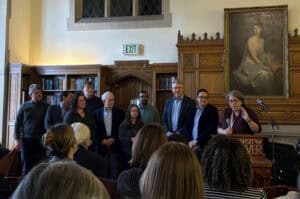
The University of Denver has awarded the Scrivner Institute of Public Policy at the Josef Korbel School of Global and Public Affairs the prestigious designation of "Institute status," recognizing its research excellence and its critical contributions to addressing today’s most pressing policy challenges. Established in 2018 through a transformative $14 million gift from Doug and Mary Scrivner, the Institute has become a leader in interdisciplinary research, civil discourse, and community engagement on local to global public policy issues.
Under the leadership of Professor and Director Dr. Naazneen Barma, the Scrivner Institute has seen remarkable growth, expanding its faculty and partnerships, more than doubling research funding, and producing numerous publications and policy reports. It has also developed innovative initiatives like the Colorado Project, Denver Dialogues, and Scrivner Policy Roundtables. “This recognition from the University is testament to the exceptional work of our faculty and staff and the Institute’s commitment to fostering meaningful policy research and dialogue at local, national, and global levels,” said Dr. Barma.
Fritz Mayer, Dean of the Josef Korbel School, praised the milestone: “The Scrivner Institute exemplifies what it means to be a hub for actionable, collaborative, and innovative public policy research. We are excited to see how its new Institute status will further elevate its impact.”
Learn more about the Scrivner Institute and its groundbreaking work at korbel.du.edu/scrivner.
Dr. Suisheng Zhao, Professor and Director of the Center for China-U.S. Cooperation (CCUSC) at the Josef Korbel School, continues to receive widespread recognition for his book, The Dragon Roars Back: Transformational Leaders and Dynamics of Chinese Foreign Policy (Stanford University Press).
Foreign Affairs magazine has named Zhao’s work among its Best Books of 2024, further solidifying its contribution to the field of international relations.
The book has also garnered high praise from leading scholars and journals:
Explore the full list of Foreign Affairs’ Best Books of 2024, at foreignaffairs.com.
More on Dr. Zhao and Center for China-U.S. Cooperation at the Josef Korbel School of Global and Public Affairs here.
Copyright ©2025 University of Denver | All rights reserved | The University of Denver is an equal opportunity institution